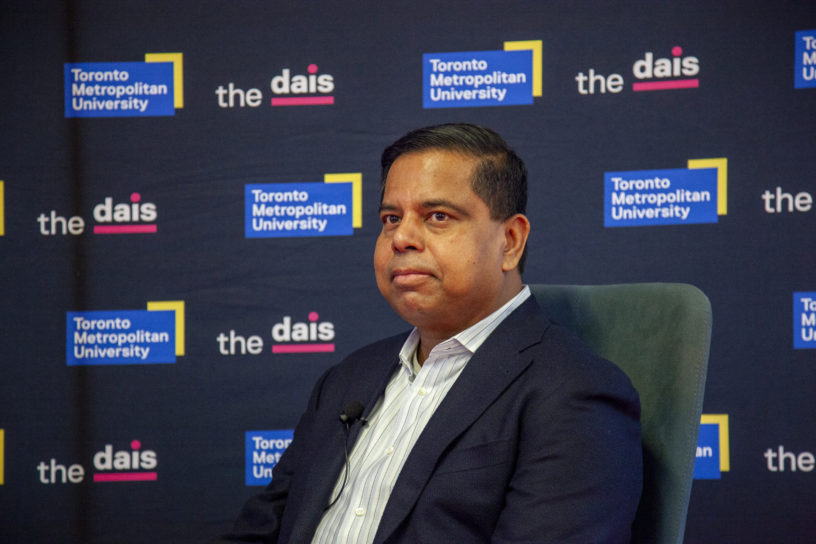By Frances Smith
Toronto Metropolitan University (TMU) Democracy Forum hosted the Minister of Crown-Indigenous Relations and previous Parliamentary Secretary to the Minister of Justice, Gary Anandasangaree on Friday.
The forum focused on federal government initiatives and challenges in Indigenous reconciliation across Canada. Although he himself is not an Indigenous person, Anandasangaree has been the minister since 2021.
It was held as part of a year-round talk series hosted by the Dais, a public policy and leadership think tank at TMU. It was hosted by Toronto Star columnist and the forum’s democracy founder, Martin Regg Cohn.
The event started with a land acknowledgment presented by the Vice President of Equity and Community Inclusion at TMU, Tanya De Mello. Following De Mello’s opening words, Cohn began the forum by questioning if the presentation of land acknowledgments risks becoming “performative” or an “empty ritual,” an opinion shared in some Indigenous communities.
Anandasangaree responded by recognizing that land acknowledgments have become increasingly performative in various settings, emphasizing that “it’s not a tick mark exercise, it will require us to understand what the treaties mean.”
He concluded this comment by saying “the core of Indigeneity is a critical component of Canada and the history that is here,” adding “acknowledging that is a very good starting point, and certainly not the ending.”
He explained that not all Indigenous peoples are recognized under Section 35 of the Charter of Rights and Freedoms, making it difficult to establish their Indigenous identity.
Anandasangaree said due to systemic factors, including “residential schools, child welfare system, six-week school [and] modern-day provincial child welfare systems,” Indigenous peoples have been “disenfranchised” from engaging in their communities.
“This is a very difficult process,” he added, describing the government’s research and legal approach to ensure the preservation of Indigenous identity.
Anandasangaree addressed concerns of systemic issues that also questioned by Cohn, including socioeconomic gaps, insufficient resources to self-govern, inadequate access to resources, failures in the child welfare system and high suicide rates in Indigenous communities.
He highlighted the need to address systemic issues, explaining that “access to basic support…is lacking” and adding that foundational elements such as “employment, housing [and] the social determinants that will enable individuals to have agency over their life and control over their future… are missing.”
The minister outlined his goals to close these gaps while “planting the seeds on self-governance [and] self-determination.” He expressed that as long as these gaps exist, having a real conversation about reconciliation would be difficult.
Anandasangaree described modern treaties and Indigenous land sovereignty as a “different architecture” compared to historic approaches and foundational elements of reconciliation. He highlighted progress with three modern negotiation Treaties initiated in British Columbia to improve relations between First Nations and the provincial government. He also announced more are expected to come in six to eight weeks.
He stressed the need for holistic mental health services in Indigenous communities to help combat the high rates of suicide.
Anandasangaree pointed to the success of a culturally grounded approach, stating, “We know that when there’s a better connection to language and culture and ways of life, we know that there’s change that happens in people.”
An example of that approach highlighted is the on-the-land program in the Northwest Territories (NWT), where young people outside of school engage in traditional practices such as hunting and spending time outdoors on Indigenous lands. The program is run by the NWT Recreation and Parks Association.
He highlighted building on the previous framework from the Truth and Reconciliation Commission to promote further reconciliation, led by the late Senator Murray Sinclair, as principles for the ministry’s initiatives.
The event’s Q&A period began with the minister taking audiences questions. Anandasangaree noted the ministry’s push for provinces to ensure Canada’s education systems “reflect the experience of Indigenous peoples,” helping students understand Indigenous identities and history.
Anandasangaree explained initiatives like post-secondary law programs incorporating Indigenous law into their courses as well as medical schools doing similar initiatives such as the Indigenous health units offered at McMaster University to engage students in reconciliation practices.
He emphasized the importance of preservation of language by funding local language initiatives under Bill C-91 in communities rather than at centralized institutions such as universities. Bill C-91, also known as the Indigenous Languages Act, received Royal Assent in 2019 and aims to support the reclamation, revitalization, maintenance and strengthening of Indigenous languages in Canada, according to Government of Canada website.
In a written statement to The Eyeopener addressing the barriers Indigenous students may face in post-secondary education—including financial challenges and cultural disconnection—Anandasangaree highlighted the 2024 federal budget allocation of funds.
He explained in the written response that they are allocating “$242.7 million over three years, starting in 2024-25, to increase access to post-secondary education for First Nations students through the Post-Secondary Student Support Program.”
He explained that this is accompanied by the Post-Secondary Education Strategies funded by the federal government in 2019—which has invested $487.5 million over 10 years and has $61.5 million of investments ongoing toward Inuit and Métis post-secondary education, his statement reads.
Additionally, Anandasangaree outlined federal measures to address systemic violence against Indigenous people, highlighting efforts to improve safety and emergency access, in his statement to The Eye.
He pointed to initiatives such as “funding 47 emergency shelters and transitional housing projects as well as creating hundreds of units within First Nations, Inuit, Métis and urban Indigenous communities across Canada to make sure people have a safe place to go.”
Anandasangaree also emphasized the importance of connectivity in remote areas, noting the government’s effort to provide “reliable internet to over 3,000 Indigenous households so that there is better access to emergency services.”
The Democracy Forum ended with the minister describing reconciliation as rooted in the ministry’s commitment toward a better world, which he states is a “far more enduring legacy for all of this.”












Leave a Reply